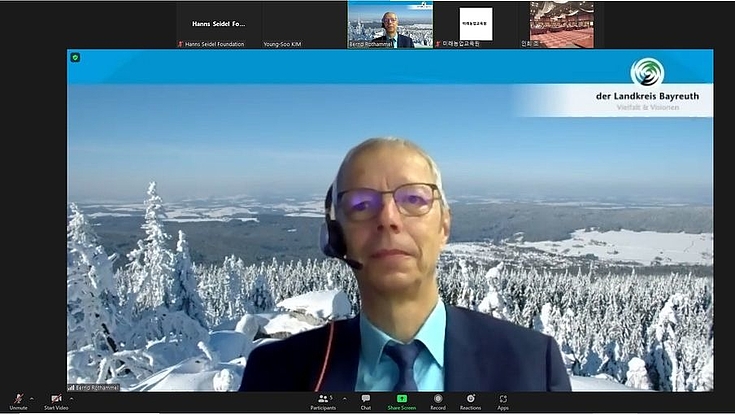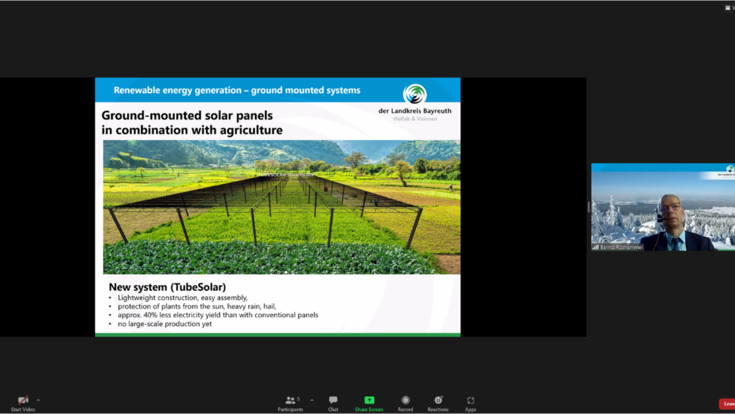Seminar
Renewable Energies in German municipalities. Example: District of Bayreuth

On December 14, 2022, HSF hosted an online seminar on “Renewable Energies in German municipalities. Example: District of Bayreuth” for MPs, representatives of institutions, organisations, and companies from the renewable energy sector in Gangwon Province such as officials from the Gangwon Provincial Administration and academics from Gangwon National University. 92 participants from the Gangwon province attended the virtual event, two HSF representatives joined the seminar, Mr. Young-Soo Kim as the organizer and translator, and researcher Nastassja Amling. Bernd Rothammel, Geoecologist, and Climate Protection Manager was invited as the main speaker to present an overview of the given topic. Bernd Rothammel is the head of the climate protection management of the district of Bayreuth. He has carried out many projects in the district of Bayreuth for many years in the field of renewable energies and climate protection on the municipal level. The online seminar on renewable energy sources in Bayreuth was a very informative event that provided representatives of the Gangwon districts some insights into the Bayreuth approach to renewable energies.
He started his presentation with a short introduction of himself, and his background, and proceeded by comparing the area of Bayreuth province and Gangwon province. He introduced the Bayreuth district and its approaches to renewable energies such as art projects.
He then explained current challenges such as the War in Ukraine and the ongoing issue of the climate crisis, as well as its impacts on the region.
In terms of the climate crisis, he demonstrated the actual and potential effects, especially for Bavaria, employing an example of the last ice age in which Bavaria looked highly different with just a temperature difference of 4 degrees. He also highlighted natural disasters, especially the Ahr Valley flooding disaster in 2021.
Based on that, he mentioned several responses which must be taken to save energy. In this regard, he stressed the importance of building insulation, namely zero-emission buildings, explained the given standards in Germany, and has shown examples.

In the following, he explained the renewable energy approach and situation, particularly for Bayreuth’s case. He introduced the successful case of green power generation in Bayreuth resulting in a surplus of power, which is exported to Bayreuth city. Furthermore, the sources of Green Power in Bayreuth were presented, including Wind power, Solar energy, Bioenergy, and hydroelectric power.
However, by comparing the energy consumption including all sources, renewable and non-renewable energy, he criticized that Bayreuth still mostly uses non-renewable energy with renewable energy only accounting for 23%. However, he shared Bayreuth’s plan to fully shift to renewable energies within the next 20 years and mentioned the resulting increase in power consumption which will be another barrier to overcome. He also mentioned a potential conflict of land use, of land being needed by different stakeholders such as the renewable energy sector, tourism, or the agricultural sector for food production. He explained the space requirements of different renewable energies and derived which renewable energies should be prioritized. According to the space requirement-based priority list, Bayreuth considered the priority to be solar panels on roofs. Mr. Rothammel introduced the already ongoing solar panel installation project of Bayreuth, and the ongoing information campaign of the city administration to convince the population to install solar panels.
Finally, he explained the difference and stressed the importance of balance between climate protection and adaption to global warming, including their subjects. He ended the presentation by explaining the adaption strategy of Bayreuth, its current state, and which specific steps were taken and will be taken in the process of shifting energies. He shared the modeling analysis results of Bayreuth including how climate change will affect the Bayreuth area in the future. For each affected area, such as “human health and civil protection”, “water management” or “agriculture, forestry, and soil”, Bayreuth set key measures which were introduced to the audience. He also explained what Bayreuth needs to do for each affected area.
The questions asked in the Q&A session at the end, have clearly shown that the presentation sparked high interest in the German approach to green energy. HSF hopes to be able to conduct more such successful online events in the future to foster international knowledge and experience exchange.
